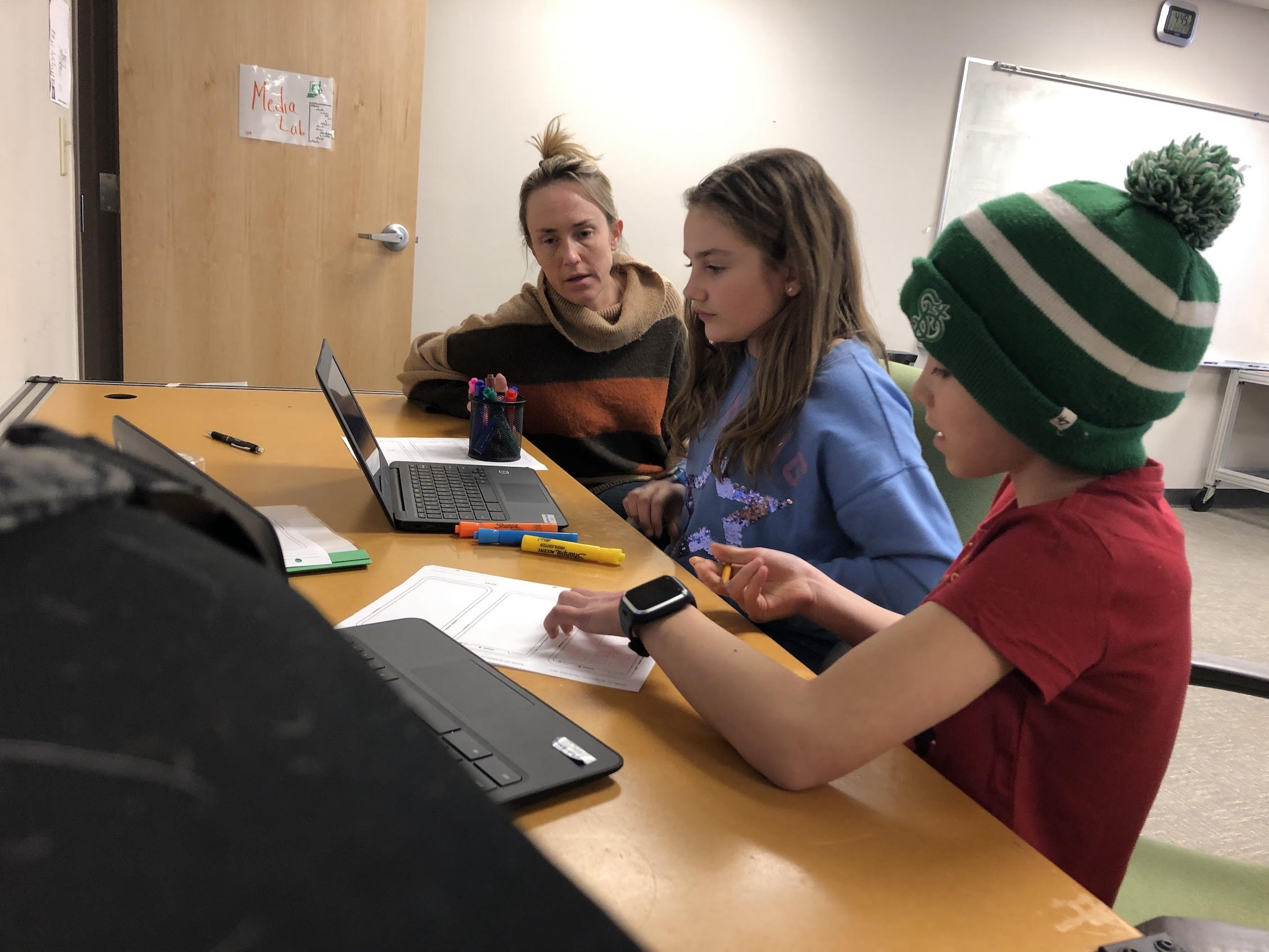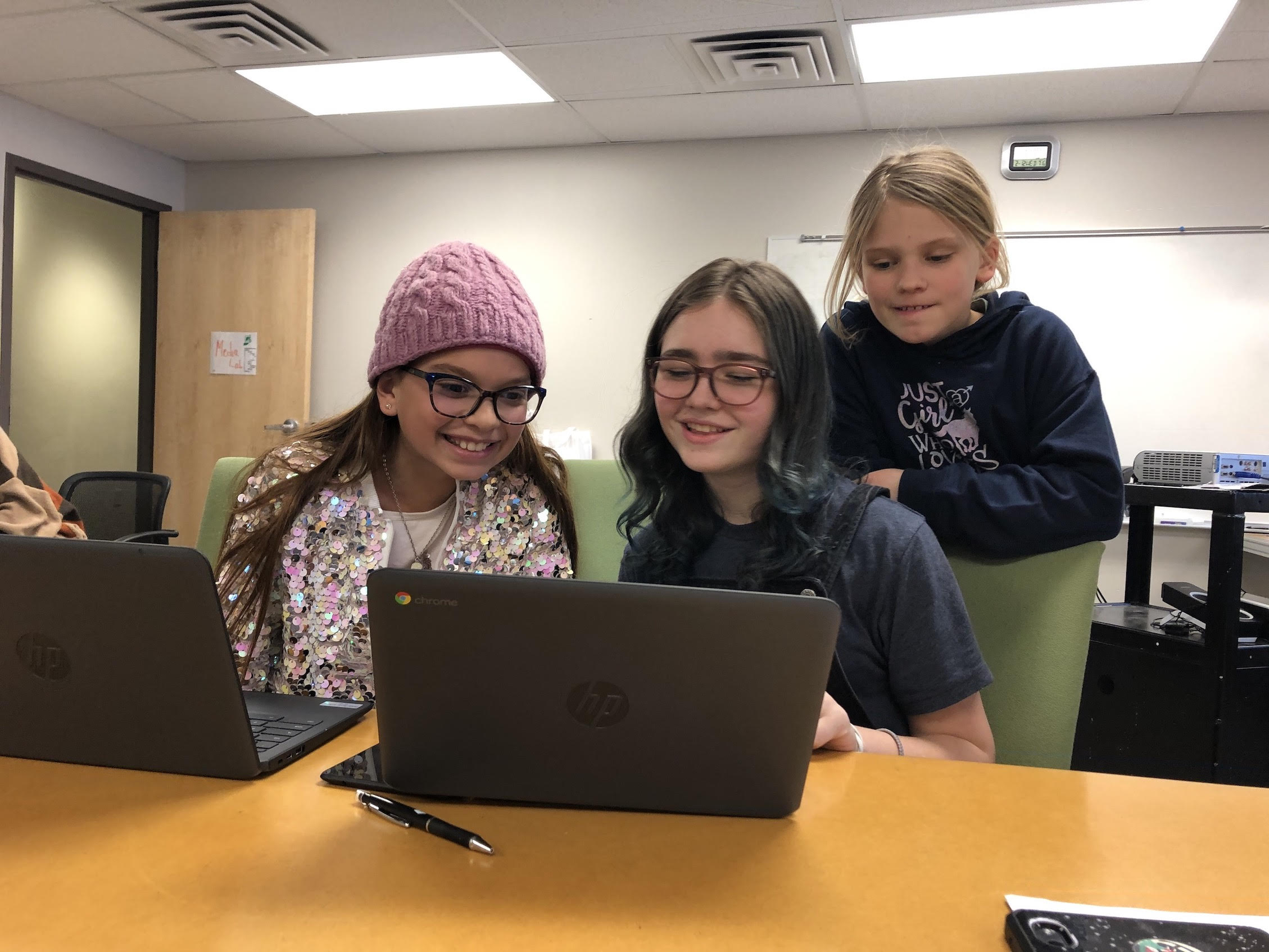Earlier this year we connected with Kate Indrelie, a long-time Technovation Girls mentor in Minnesota. Kate took time out of her busy schedule to tell us about her 7 years of experience mentoring teams in St. Paul. During her tenure as a Technovation Girls mentor, Kate has worked with about 125 girls, supporting them through the curriculum, helping them develop stronger time-management skills, boosting their confidence, and helping them believe in themselves. We’re so grateful to Kate for sharing her time and advice with us, and for her incredible commitment to Technovation Girls, and all the teams she’s worked with.
How have you seen the Technovation program impact the students you’ve mentored? What impact has mentoring Technovation participants had on you?
Many of the students involved in Technovation at my school have come back for many years, so it’s been awesome to see them grow and learn. The school where I mentor doesn’t do a lot of work with technology, so there have been students who had only used a keyboard a handful of times, let alone done anything like coding. For those kids, it’s great to see how empowered they feel in learning how to research, code, and make a video and presentation, and they get so excited for what other things they can learn and create.
For the returning teams, it’s been awesome to see the girls build on their strengths and successes from past seasons. Most of my veteran teams start each year with a big list of questions for mentors and a list of things they want to do better that year, and can’t wait to hit the ground running. Of the girls that have gotten to or are graduating high school – there are some with definite interest in pursuing CS or entrepreneurship, and they’re all still very interested in solving community problems.

The most obvious impact across the board, however, has been in the confidence the girls gain in their tech skills and their presentation skills. Many of the girls have started the season terrified of presenting their ideas to judges and feel like they can’t verbalize anything about their process or their projects, but with support from their mentors and teammates they’ve shown so much growth in expressing themselves in a public forum like the pitch event. The veteran teams show incredible growth in this year after year, and they’re excited rather than terrified to share their ideas.
Like many mentors, I feel like mentoring in Technovation has a bigger impact on me than the kids. Year after year I am astounded by the enthusiasm, passion, and creativity of the girls. I always seem to go into a season with this expectation of seeing the same couple of problems and app ideas, and every year groups come up with something incredible I never would have thought of. Their passion is also infectious. They feel so deeply about the problems they’re tackling with their apps, and it’s a gift to work each week with girls so intent on, and so convinced that they have the power to change the world.
Why do you think mentorship is important?
I think young people seeing (and working alongside) adults that are passionate and excited about being lifelong learners, committing to projects, and working in a community is important. The educational life of kids is often an “us/them” as it relates to adults, but mentoring in Technovation is such a team experience that it breaks down a lot of those barriers and allows kids to see how we’re all learning, breaking down problems, using the resources of our networks, etc. They’re experiencing “real world” work alongside adults and that allows them to see realistic pathways toward all kinds of futures. With Technovation, the girls see that they’re doing real-world work – and they can picture themselves in CS or entrepreneurial career paths or college or high school courses because they’ve had the support and felt empowered and successful (and had fun).
Do you have a background in STEM/computer science? If not, what drew you to Technovation?
I was a high school English teacher, but I had worked at a technology summer camp for 8 years prior to starting Technovation. I started that job teaching video editing and graphic art, but eventually was teaching mostly game creation for young kids (simple app based programming). Technovation was an exciting opportunity because it allowed me to take the creativity/technology parts I loved about that camp job into my regular teaching job, and to share to empower girls. The community-problem based project fit really well with the mission of the school I taught at, so it seemed like a perfect fit.
What trends have you seen in the people you mentor over the last few years? How has being a mentor changed during these complicated times?
Traditionally, in many American schools in particular, students look to teachers for the answer. They might have an ingrained sense of there being a right and wrong answer to most problems, and don’t trust themselves or the resources at their disposal to find it. Technovation is great because the kids see that problems are messy and don’t necessarily have a single solution, and probably most importantly, their mentors are just like they are – using resources at their disposal to search for solutions that they don’t know (or maybe can’t know) outright.

An important part of that mentor/student relationship in the current climate is helping students to select and use information in that vast network at their disposal. Kids have heard the term “fake news,” but are unlikely to understand the implications behind disinformation in the modern age, and how to critically evaluate the information they’re reading or watching. Helping students with digital literacy is definitely a new and important task for mentors since many of the teams are conducting research on community problems that might be considered “hot button” issues where disinformation is common.
The other often misunderstood trend is the ubiquity of tech and devices for young people. There’s a lot of talk about the dangers of screen time, and that kids are addicted to their phones – but I think programs like Technovation help challenge the not-so-scientific parts of those narratives. Kids are using technology to create amazing things – and they can see their phones as not only entertainment devices, but ways to help create a better world.
What advice would you have for a non-technical person who would like to get involved with something like Technovation?
Technovation, through the support of the curriculum and the local chapters, makes it super easy to get involved regardless of technical expertise. I’ve been doing this for 7 years but still feel very in the dark regarding a lot of the coding parts of the experience, but with the help of other mentors and the curriculum, I feel empowered to help all the teams. That said, good advice is just being honest with the students – when I don’t know something, I look it up, or I reach out for help, and the kids get to witness that.
There’s also SO much more to Technovation than tech skills. I consider a lot of the work I do with teams to be project management – helping them understand the tasks at hand and chunking it into achievable goals and supporting them along the way. The entrepreneurial side of helping teams ideate, research, make a business plan, and work on presentation skills are also a huge part of the program that can attract all kinds of mentors.
What do we as adults have to do to help prepare students for the workforce of the future?
I think one of the big ones is helping students to work effectively on a team (and knowing one’s strengths and challenges in working on a team), as well as encouraging them to value inclusivity, diversity, and to work toward cultural understanding. If this generation is solving the problems of tomorrow (and today), they need to understand the context of the diversity of the world around them, and the ways in which that diversity will help their work.
In addition, teaching students how to access, evaluate, and employ the many sources of learning at their disposal is key. This generation has more resources at their disposal than any previous one, and helping them to ethically and effectively access those resources is key.
I think this is gaining traction in the current educational climate, but teaching kids that it’s okay to fail is also essential. Call it perseverance, drive… whatever – giving students permission to try something they don’t know will work is key in any field (especially CS), and giving them the tools to look at any “failures” (or successes) and learn from them, iterate on them, and keep going will definitely prepare them for any field.

